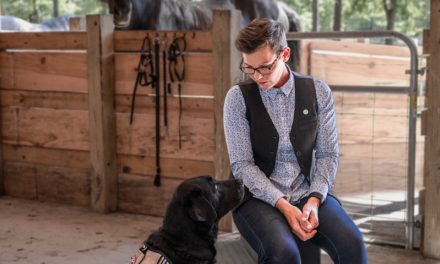 Time was when the words to a country song entitled “Get Along” might be followed by “little dogie,” sung by the likes of Tex Ritter or Sons of the Pioneers, romanticizing cowboys of the Old West. Now Kenney Chesney, with more than 30 million albums sold worldwide under his belt, has broached a very different and timely subject in his recent release of that title.
Time was when the words to a country song entitled “Get Along” might be followed by “little dogie,” sung by the likes of Tex Ritter or Sons of the Pioneers, romanticizing cowboys of the Old West. Now Kenney Chesney, with more than 30 million albums sold worldwide under his belt, has broached a very different and timely subject in his recent release of that title.
Outfitted in a traditional straw cowboy hat and boots, the country artist, songwriter and producer sings to his fellow countrymen of the importance of stepping back from the current wave of political, cultural and social divisiveness in America to the simple things in life, the things that truly matter. His genre of music often reflects those sentiments.
Here’s the chorus of “Get Along” from his 2018 album “Songs for the Saints”:
Get along while we can
Always give love the upper hand
Paint a wall, learn to dance
Call your mom, buy a boat
Drink a beer, sing a song
Make a friend, can’t we all get along
The first time I heard the song and realized its message, I did a heartfelt, involuntary fist pump because Kenny was singing my feelings. That’s one of the reasons certain songs become popular – the singer is expressing our own feelings about life. It’s as if we share a kinship with the performer. In this case, many of us do. Not personally, but as a heart-to-heart connection with another human being. I believe that this particular number speaks for many Americans today who simply want to live their lives and get along with others.
During my 30 years as a travel writer, the one thing I’ve observed that surpasses every cultural, economic, emotional and geographic boundary is that what most people seem to want – not just in our country but in the world – is to create good lives for themselves and for their children, despite Capitol Hill’s vanity of assuming that it and its musings, whims and directives should be the focus of every citizen… above home, family, friends and the wellbeing of other human beings. And of nature and our planet as well. New York Times bestselling author Barbara Kingsolver addresses these issues poignantly in her 2012 novel Flight Behavior. But I digress.
It’s the human connections that get us through our day-to-days. And through this life, for that matter. Having another person reach out to us in the midst of a struggle or confusion can lift our heart, our spirit, our day. Those “golden” incidents stay etched in our memory, glowing, leaving an inner warmth and hope in their wake.
During part of the 1980s, I spent time in New York City. Miss Southern Hospitality in the crazy-fun, sometimes-scary, ever-fascinating Big Apple. Needless to say, initially, the coldness, not-gonna-make-me-look-you-in-the-eye demeanor of fellow passers-by convinced me that I was totally on my own and that no one would deign to lend a hand should I need one. But time and time again, I was taken by surprise at that fallacy.
My first realization occurred when I’d been staying with resident cousins for a week of museum and gallery visits, dipping my toe into the vast pool of NYC culture. When leaving their apartment to return home to Kentucky, I’d been given specific directions for taking the subway downtown and switching to Grand Central Station. But at that time, I knew so little about the city that my eyes glazed over at my relatives’ briefing as I bid adieu. Surely I can just ask someone, I thought. So as I boarded the car, looking anything but citified in well-worn jeans with a backpack, I posed the transfer question to a middle-aged lady who gave me but a furtive glance as she mumbled an answer I only pretended to understand. Afraid to ask her to repeat her reply, I clung to a post in the car for what I believed to be enough stops. I began to exit but suddenly was stopped. Someone had grabbed me by the backpack. I turned to see the same woman smiling at me, light glinting off a gold front tooth.
“Honey,” she said, “It’s not this stop. You got a couple more. I’ll tell you when to get off.” That helpful stranger was true to her word, and I made my connections on time with a lighter step.
On another occasion, long story very short, I’d just been dumped unceremoniously by a short-term boyfriend in the big city. I’d taken a taxi – alone – to Penn Station, where I awaited a train – alone – to take me out of my urban unhappiness to the comforting arms of a friend on Long Island. On the hard wooden bench I perched unmoving, staring at early morning sunlight filtering through high-set windows, trying my darndest not to cry.
Something touched my arm and made me jump. It was a man who’d been sitting several seats down from me. He was well dressed and his face was kind.
“Are you all right?” he asked. “I was concerned that you might not be.”
With that question, I looked him in the eye, burst into tears and told him the whole sad story. And that nice man listened to every word, as if he’d been waiting there to hear it. He didn’t say much, just a few reassuring words. But his gesture of care finally brought my waterworks to an end. He wished me well as we said goodbye, and I never saw him again. He didn’t have to get involved but he did, and I recall his act of kindness to this day.
One piece of advice learned in many childhoods applies to the world, despite religious or cultural affiliation. The Golden Rule. Remember? Do unto others as you would have them do unto you. That wisdom still works today and is – as it has been through the centuries – a simple dictate for an upbeat, caring life.
So . . . can’t we all get along?






